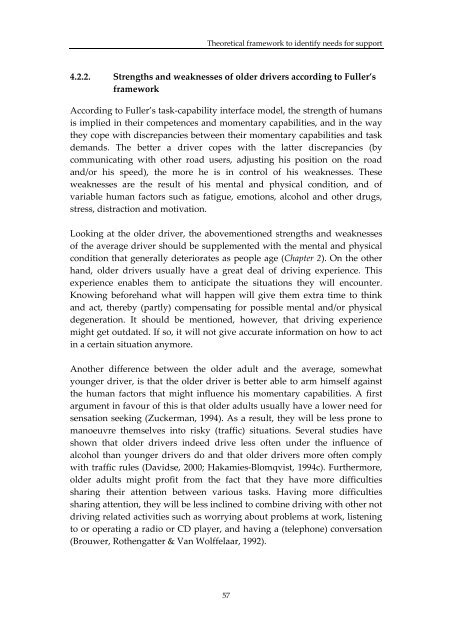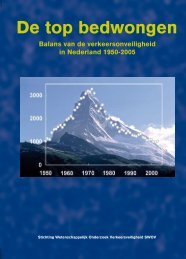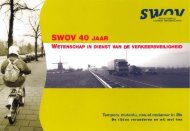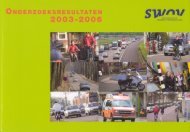Assisting the older driver - SWOV
Assisting the older driver - SWOV
Assisting the older driver - SWOV
Create successful ePaper yourself
Turn your PDF publications into a flip-book with our unique Google optimized e-Paper software.
Theoretical framework to identify needs for support<br />
4.2.2. Strengths and weaknesses of <strong>older</strong> <strong>driver</strong>s according to Fuller’s<br />
framework<br />
According to Fuller’s task‐capability interface model, <strong>the</strong> strength of humans<br />
is implied in <strong>the</strong>ir competences and momentary capabilities, and in <strong>the</strong> way<br />
<strong>the</strong>y cope with discrepancies between <strong>the</strong>ir momentary capabilities and task<br />
demands. The better a <strong>driver</strong> copes with <strong>the</strong> latter discrepancies (by<br />
communicating with o<strong>the</strong>r road users, adjusting his position on <strong>the</strong> road<br />
and/or his speed), <strong>the</strong> more he is in control of his weaknesses. These<br />
weaknesses are <strong>the</strong> result of his mental and physical condition, and of<br />
variable human factors such as fatigue, emotions, alcohol and o<strong>the</strong>r drugs,<br />
stress, distraction and motivation.<br />
Looking at <strong>the</strong> <strong>older</strong> <strong>driver</strong>, <strong>the</strong> abovementioned strengths and weaknesses<br />
of <strong>the</strong> average <strong>driver</strong> should be supplemented with <strong>the</strong> mental and physical<br />
condition that generally deteriorates as people age (Chapter 2). On <strong>the</strong> o<strong>the</strong>r<br />
hand, <strong>older</strong> <strong>driver</strong>s usually have a great deal of driving experience. This<br />
experience enables <strong>the</strong>m to anticipate <strong>the</strong> situations <strong>the</strong>y will encounter.<br />
Knowing beforehand what will happen will give <strong>the</strong>m extra time to think<br />
and act, <strong>the</strong>reby (partly) compensating for possible mental and/or physical<br />
degeneration. It should be mentioned, however, that driving experience<br />
might get outdated. If so, it will not give accurate information on how to act<br />
in a certain situation anymore.<br />
Ano<strong>the</strong>r difference between <strong>the</strong> <strong>older</strong> adult and <strong>the</strong> average, somewhat<br />
younger <strong>driver</strong>, is that <strong>the</strong> <strong>older</strong> <strong>driver</strong> is better able to arm himself against<br />
<strong>the</strong> human factors that might influence his momentary capabilities. A first<br />
argument in favour of this is that <strong>older</strong> adults usually have a lower need for<br />
sensation seeking (Zuckerman, 1994). As a result, <strong>the</strong>y will be less prone to<br />
manoeuvre <strong>the</strong>mselves into risky (traffic) situations. Several studies have<br />
shown that <strong>older</strong> <strong>driver</strong>s indeed drive less often under <strong>the</strong> influence of<br />
alcohol than younger <strong>driver</strong>s do and that <strong>older</strong> <strong>driver</strong>s more often comply<br />
with traffic rules (Davidse, 2000; Hakamies‐Blomqvist, 1994c). Fur<strong>the</strong>rmore,<br />
<strong>older</strong> adults might profit from <strong>the</strong> fact that <strong>the</strong>y have more difficulties<br />
sharing <strong>the</strong>ir attention between various tasks. Having more difficulties<br />
sharing attention, <strong>the</strong>y will be less inclined to combine driving with o<strong>the</strong>r not<br />
driving related activities such as worrying about problems at work, listening<br />
to or operating a radio or CD player, and having a (telephone) conversation<br />
(Brouwer, Ro<strong>the</strong>ngatter & Van Wolffelaar, 1992).<br />
57
















